Marisa Tomei The Wrestler Interview
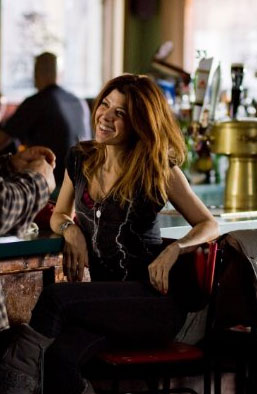
MARISA TOMEI BARES BODY AND SOUL FOR 'WRESTLER'.
EXLUSIVE Marisa Tomei, The Wrestler Interview by Paul Fischer.At a very youthful 44, Golden Globe nominee Marisa Tomei is discovering intense, very sexual women to play, such as the stripper and single mother scared to form a romantic relationship with Mickey Rourke's wrestler. But she loves the challenge and doing sex scenes at this time in her life is no big deal as she confided to Paul Fischer in this exclusive interview.
QUESTION: Was it this character, or working with Darren, that you really wanted to do?
MARISA TOMEI: Well, it was mostly that I really wanted to work with Darren. And I have just respected him for so long, and I just couldn't say no. Couldn't resist him.
QUESTION: Did you do any research for playing a stripper? Did you do any research for this?
MARISA TOMEI: Darren talked to a lot of girls beforehand, and he asked a couple girls to come and talk to me, then I went to a bunch of clubs on the different coasts, because I was living in LA, and I get back to New York. The usual way.
QUESTION: What did you discover during this process?
MARISA TOMEI: Well, I mean, it's just like any other group. You know, there are a lot of stereotypes and I think that Darren really wanted to avoid them. He didn't want it to just be hooker with a heart of gold, like, a really downtrodden character. So I tried to focus on the dancers in the business who are really creative. Who get something really empowering out of their dancing, and who are kind of more like good-time girls, rather than just really hard luck cases.
QUESTION: How gratifying is it for you that the older you get, the richer the roles seem to be coming your way?
MARISA TOMEI: Well, it's really nice to just keep working, and finding really good character parts.
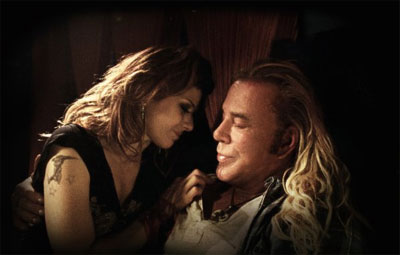 QUESTION: It's interesting that you have explored various aspects of your sexuality in some of these last few indie movies that you've done. Is it empowering for you as a woman, at this particular stage of your life, to be able to do that?
QUESTION: It's interesting that you have explored various aspects of your sexuality in some of these last few indie movies that you've done. Is it empowering for you as a woman, at this particular stage of your life, to be able to do that?MARISA TOMEI: Well, I just think that it's nicer to have a stronger foundation inside, and not - and feel in control of my body.
QUESTION: Is it nerve-wracking to do the kind of stuff that you have to do in this movie, and the other movie you did with Philip Seymour Hoffman, which I thought you were absolutely amazing in.
MARISA TOMEI: Well, it's the most natural thing in the world, really, so it's kind of probably easier than some emotional - some things that an actor is asked to do. But - you know, it depends who you're with. And of course, I was with Sidney Lumet, and the guys who I've had to work with have just always been - it really brings out their protective side, actually.
QUESTION: Two decades after winning your Oscar, are you kind of surprised that you're still working as much as you are at the moment? And are you looking for different things than you were when you were in your 20s?
MARISA TOMEI: Well, I've always done a lot of plays, and I have always worked, hoping that I'll continue working as long as I can.
QUESTION: What are you looking for, at this particular stage?
MARISA TOMEI: Well, I'd like to do some period films. I'd like to do a musical. I'd like to -
QUESTION: Do you have a favorite musical you'd like to do on stage?
MARISA TOMEI: Well, I really do like Sweet Charity, but they just did it. So I don't know when the next - I don't know about that. But that would be something I'd be interested in. Those are some of the different genres I'd like to do. There are a lot of great directors, and I'd like to be in some leading roles.
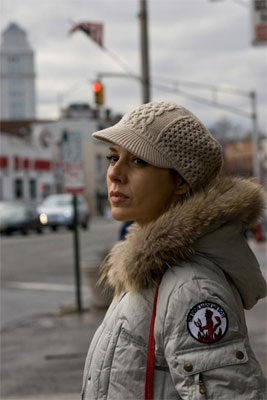 QUESTION: How picky are you?
QUESTION: How picky are you?MARISA TOMEI: Well, I like to work. But I don't really want to work if my heart isn't in it. And that - you can't always - it's not always that way. I mean, sometimes it's more for money, and sometimes it isn't. But for the most part, I really can't commit to something unless there's something that's gonna awaken me every day, and I'm gonna feel enlivened, and feel like there's something that's piquing my curiosity.
QUESTION: Do you think you're more at home in the independent world?
MARISA TOMEI: I guess so. That's where I've been, mostly.
QUESTION: What else are you working on at the moment, Marisa?
MARISA TOMEI: I'm going to do this comedy with the Duplass Brothers in the early winter, in January, here in LA. Safety Men.
QUESTION: And who else is in that?
MARISA TOMEI: Jonah Hill, and maybe John C. Reilly.
QUESTION: Do you enjoy showing off your comedic side, again?
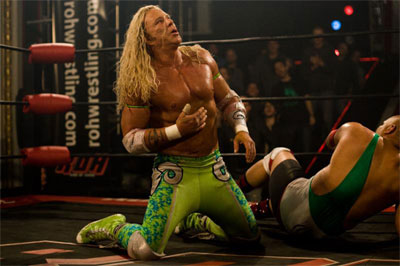 MARISA TOMEI: Yeah. I'm really looking forward to that.
MARISA TOMEI: Yeah. I'm really looking forward to that.QUESTION: And whom do you play in that movie?
MARISA TOMEI: Well, I just know that it was in the paper today, so we're not really telling anybody about it. So. Let's wait 'til all of the deals are closed.
QUESTION: Are you doing anything excited for the holidays?
MARISA TOMEI: I'm doing what I always do, which is go back to the East Coast and have a New York Christmas. And spend a few weeks solid doing nothing but hanging around with the family and eating. Just like - just like most people do!
QUESTION: You're not traveling, or anything.
MARISA TOMEI: No - no. Not during Christmas.
QUESTION: Is there one particular role, if you could - if somebody said to you, "Okay, you can play any woman you like, classic or modern," who would it be?
MARISA TOMEI: Do you know who Jane Jacobs is? She's pretty cool. I think is really, really interesting. I think that would be a really good story, the way that she took on Robert Moses, and basically saved Manhattan from being just a big highway, a superhighway. And she really was really community-oriented. And she's really a character. And so I think kind of - that was in the '60s, and that was really a more kind of contemporary person. But some - I don't know. Mata Hari's a pretty interesting character. I think there's plenty of women that haven't been seen yet.
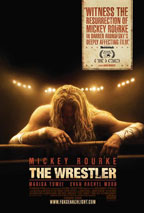
The Wrestler
Starring: Mickey Rourke, Marisa Tomei, Evan Rachel Wood, Ernest "The Cat" MillerDirector: Darren Aronofsky
Genre: Dramas
Runtime: 1 hr 45 mins
At first glance, Darren Aronofsky's THE WRESTLER may seem like a departure for the oftentimes frenetic filmmaker, and in some ways it is. When this story of a past-his-prime performer is compared...
At first glance, Darren Aronofsky's THE WRESTLER may seem like a departure for the oftentimes frenetic filmmaker, and in some ways it is. When this story of a past-his-prime performer is compared to PI, REQUIEM FOR A DREAM, and THE FOUNTAIN, there is relatively little trace of psychoscientific addiction imagery, hip-hop editing, or grimly elegant peeks into dreams, nightmares, and otherworlds.
Comic moments are plentiful. Aronofsky's signature close-ups of faces have been replaced with ones that force themselves into wounds inflicted for visceral spectacle. Much of the time the camera floats and bobs with an observant, almost documentary-like quietness, ethereally following the wrestler as if it were his past, and the viewer may perceive vague connections to a later, lonelier, less legitimate Rocky Balboa.
But Mickey Rourke isn't the Italian Stallion--he's Randy "The Ram" Robinson, a man who has spent decades slicing himself open in choreographed fights while adoring crowds roar. Pro wrestling isn't as lucrative as it was for Randy in the 1980s, but he stays at it while working menial jobs because performing isn't just the only thing he craves--it's the only thing that, at 50, he knows how to crave. While courting his one true friend, a stripper named Cassidy (Marisa Tomei), Randy does his best to restart a relationship with the angry daughter he abandoned. But Rourke imbues the image of Randy, ready to pounce from the ropes, looking almost as unreal as the box art on action figure packaging, with an expression of pain, desperation, and joy. It's a close-up that makes two things clear. For one, Randy's charisma is inseparable from the crippling fixation that's kept him alive. For another, THE WRESTLER might be at once a simpler and more complex meditation on addiction and eternal struggle than any of Aronofsky's earlier work.
MORE
- Mission: Impossible Fallout
- Glenn Close The Wife
- Allison Chhorn Stanley's Mouth Interview
- Benicio Del Toro Sicario: Day of the Soldado
- Dame Judi Dench Tea With The Dames
- Sandra Bullock Ocean's 8
- Chris Pratt Jurassic World: Fallen Kingdom
- Claudia Sangiorgi Dalimore and Michelle Grace...
- Rachel McAdams Disobedience Interview
- Sebastián Lelio and Alessandro Nivola...
- Perri Cummings Trench Interview



